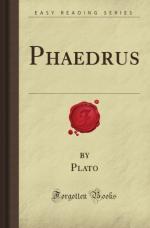|
This section contains 8,080 words (approx. 27 pages at 300 words per page) |

|
SOURCE: "Phaedrus the Fabulist," in Aufstig undNiedergang der Romischen Welt, Vol. 32, No. 1, 1985, pp. 497-513.
In the following essay, Currie examines the literary tone and worldview of Phaedrus and emphasizes the influence of classical Greek literature in his poetry
I. Introduction
Under the name of Phaedrus there have descended to us five books of little stories in verse which the author seems to have called fabellae Aesopiae ("anecdotes in the manner of Aesop").1 This œuvre is not complete as it stands. The length of the books is disproportionate, the total of ninety-three fables being distributed thus over the five: 31, 8, 19, 25, and 10. None of the books contains more than 425 lines, and two (2 and 5) have well below 200 each. The fact that Phaedrus at one point (1 prol. 6) remarks that "not only beasts but trees too speak" in his fables, whereas in such of the surviving tales as are indubitably from his pen trees...
|
This section contains 8,080 words (approx. 27 pages at 300 words per page) |

|


